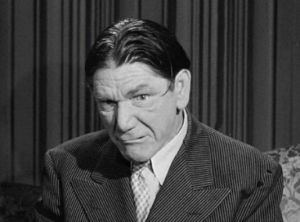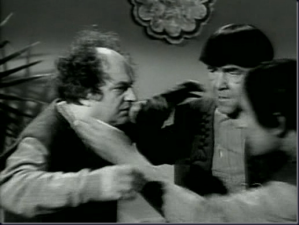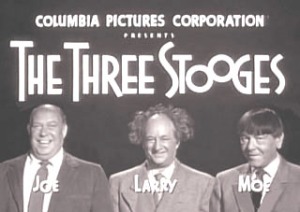“Why do men fight?” In his old age, my Dad would often ask that somewhat rhetorical question. I knew not to answer. He would answer it, explaining that men fight because they’re trained to fight–no other reason. I always saw the military through my Dad’s prism. He was a veteran of two branches of the military and two wars. He was as proud as one could be of his service. I was born in 1962, perfect timing to avoid military service. The draft was suspended before I was 18, and there were no wars while I was a young man. Besides, Dad told me that I wasn’t military material anyway. He was right.
Almost everything Dad told me about his service was in the last 5 years of his life. Prior to then, I’d heard a few stories, like the time he debriefed a couple of pilots who spotted UFOs over China. He also told a few stories about the time he spent in the hospital in WWII. Otherwise, like a lot of men of his generation, he didn’t talk all that much about it.
In January of 2003, Dad had a stroke while at a meeting. He passed out, but came to almost immediately. Because he seemed disoriented, a friend of his called me and said “Earl had some kind of spell. You better check on him.” I called Dad, and he seemed fine but very tired. I made him promise to see the doctor in the morning. I talked to Mom, too, and she said he seemed okay.
Turns out that Dad had a major stroke that night. Oddly, he had no severe physical effects from it, but it did affect his mind. At first, I couldn’t tell any difference, but one day shortly after the stroke, my mother called and said I needed to make the 3 hour drive to Harlan to see them. It was, she said, “a crisis.”
My mother was given to hyperbole, and I assumed this was more of the same. She had fallen about a week before Dad’s “spell” and was still pretty sore. I was talking to them both daily, and he seemed fine to me. Nevertheless, I headed down there.
When I got there, Mom was on the couch and Dad was in his usual spot in the kitchen. I sat down with him and asked if he was okay. He said: “Did I ever tell about Korea?” He then drew a map of Korea and told me about it. In detail. He drew the map from memory, and it was remarkably accurate. After about an hour and half of listening, I told Mom: “Okay. You’re right. Something is wrong.” After a few doctor’s visits, we found out he had a significant stroke. As with a lot of my Dad’s ailments, he was an unusual patient. His doctor at the University of Kentucky told me that out of the thousands of stroke patients they see each year, they get 3 or 4 like him–those who suffer severe strokes without physical damage. The good news was that the doctor told me he would have these spells of “delirium” where he would talk and talk, but that it would get better. It did. In the meantime, I learned a lot I had never known.
Oh, and my mother was right. It was a crisis. Her fall led to a series of issues for her, and she was dead by May. Dad was alone now, and we had much more time to talk than ever before. He wore me out. As with a lot of things, what at first was maddening turned out to be a blessing. For the next five years, I got to know him in a way that I never had up until then.
Dad was born on January 19, 1925 in Evarts, Kentucky, the fifth of seven children. He had four older sisters–Emma, Pauline, Mabel and Mildred–and two younger brothers–Jack and Paul. His father, Walker, was a coal miner and later ran a gas station. Dad grew up poor. He said “You know how people say they were poor and didn’t know it? WE knew it.”
Dad joined the Navy in late 1942. He turned 18 on January 19, 1943. He didn’t finish his senior year at Evarts High School, but he graduated anyway. They would do that for you in those days. My Granny accepted his diploma. He was 5′ 5″ and weighed 115 pounds.
Dad went to the Great Lakes Naval Station in Illinois. The last time I spent the night at Dad’s house, he said to me–completely out of the blue–“Did I ever tell you about playing the bugle?” No, he hadn’t. Here’s what he said, almost word for word:
“When we got to Great Lakes, they asked if anyone could play the trumpet. Of course, you know I was an outstanding trumpeter. I said I could, and the Petty Officer said ‘You play Taps at lights out.’ Well, buddy, I knew I could do that. So, I played Taps at lights out every night. Then, I’d go to my bunk, square away my bugle and listen to everyone cry themselves to sleep. Every night. We were all children, and we all wanted was to go home. How ’bout that?”
Dad saw no action in the Navy. He did get in a plane crash in Florida. The transport plane took off without refueling and came down right after take off. Dad was unhurt, but he saw one man decapitated. When he got to Panama, he got sick. Very sick. I’m not sure what he caught, but he always said it was either malaria or black fever or both. He also got jungle rot, which ate up his feet. That pretty much ended his chances of seeing action in the Pacific. When he was in the hospital, nurses used to bring people to see him to show how young he was. As Dad liked to say, “I was a just a little fella.”
The Navy ended up training Dad to be an airship rigger. That’s right, airships–blimps. Dad noted many times that he couldn’t have been trained in a more useless vocation, although Goodyear did offer him a job. By 1946, Dad was out of the Navy. With the future of airships not looking promising, he had to do something with his life.
Dad never hesitated to credit the GI Bill for his success in life. All he’d ever aspired to was a “good job outside.” By that, he meant at the coal mines but outside, not underground. Instead, he got to go to college. He went to the University of Kentucky and immediately signed up for Air Force ROTC.
Dad had enjoyed the military life but didn’t like being an enlisted man. He wanted to be an officer, and college gave the chance to do that. He graduated with a degree in geography and as a Lieutenant in the Air Force. He wasn’t a pilot. He trained to be an intelligence officer. He didn’t think there would be another war as soon as Korea, and he didn’t think the pilots would have much to do during peace time.
Well, Dad ended up in Korea, where he was an intelligence officer. He was attached to the 51st Fighter-Interceptor Wing of the 5th Air Force. He oversaw spy missions. When the war ended, he came home aboard a morgue ship. It was the only ship heading out, and he took a ride along with 1500 dead soldiers. “It was a quiet voyage,” as he liked to say.
Dad returned to Evarts. He had met my mother just before leaving for Korea–she was a school teacher at Evarts High School. They married in 1957 and had three children. Me, my older brother Tom and younger brother Richard. Richard died in 1987 at 20 years old. Dad weathered that like he did everything else.
Dad went on to serve 30 more years in the Reserves. Most of his service was as a Liaison Officer for the Air Force Academy. He recruited potential cadets for the Academy. He loved every minute of it. We also got to visit the Air Force Academy quite a few times.
Dad had a variety of jobs, including Health Department Inspector and field agent for the old Kentucky Water Pollution Control Commission. His greatest success was as one of the first environmental consultants for coal companies. Nothing, however, topped his military experiences.
With all his military service, one would think Dad was a super-patriot. Not really. He was always proud of the military and his own service, but he had a very cynical view of wars and those who start them. He did not believe that there were war “heroes.” He told me that there were two types of “heroes”: One was a person caught in a dangerous situation who just did what he was trained to do. The other was a crazy man who just didn’t care. Dad’s view never wavered. Soldiers do what they are trained to do. Period.
Here’s an example of Dad’s view. He served in Korea with a pilot about whom a movie was made. What Dad remembered about him was having to tell the pilot that he would be court-martialed if he got arrested again. As Dad said, “He wasn’t a hero. He was crazy.”
Here are some of the things Dad drove home to me, over and over:
- Soldiers aren’t driven by patriotism. That might be why they are in the military, but it’s not what drives them. Discipline and training are their motivators. You are trained to follow orders, and that’s what you do.
- No one wants to die for their country. They’ll do it, but not because they want to do it. Everyone he knew wanted someone else to die for their country. He met a lot of injured in the hospital. He said not a one of them thought it was worth it.
- World War II was a miserable experience for almost everyone involved.
- Nothing–nothing–got his back up more than politicians talking about soldiers “defending freedom.” Dad’s view was that wars may be about freedom–but maybe not. They’re about whatever a politician decides is worth it.
- He despised George Patton. He said Patton was a “glory hound.” Dad told me that when he was in the Navy, he “heard about Patton slapping that boy in the hospital,” alluding to the famous story of Patton slapping a shell-shocked soldier. “Slapping was too good for that SOB. They should have shot him.” I said something like: “Geez, Dad, the poor guy was in the hospital.” Dad: “I’m not talking about him. I’m talking about Patton!”
- He also wasn’t impressed with General MacArthur, either. “A soldier who can’t follow orders isn’t a soldier.”
- Never, never underestimate the importance of the GI Bill. Without it, he never goes to college, and we all end up suffering as a result.
You’d be wrong to think my Dad didn’t love his country or the military. He did, warts and all, but he taught me to never overlook the warts.
He drew me maps of Korea and showed me where they flew spy missions. He told me detailed stories right down to the names of those involved and even dates. His stroke had scrambled up his recent memory. He could remember most things, but he got the timing of things out of order. His military career, though, stayed sharp.
Without intending to do so, Dad learned to compensate for his memory problems. He kept notes. He had a billing paying system that required him to keep every bill and envelope, but it worked. He kept track of his medication on a legal pad that he kept with him at all times.
I also found out some less serious things. When he was at Great Lakes, he used to like to visit the “Old Sailor’s Home.” He said: “I would sit and listen to the old salts tell their tales of the days of wooden ships and iron men.” Wooden ships and iron men. That had always been a favorite expression of Dad’s. I never knew that he heard it at the Old Sailor’s Home. He told me many times that, if he couldn’t take care of himself, to just send him to the Old Sailor’s Home. Of course, he didn’t really mean that. The one time my brother and I talked to him about “assisted” living, he responded with “I will die in this house!” (Which he almost did, by the way). That was the end of that.
What Dad enjoyed most was being Colonel Earl, as a lot of folks in Harlan County called him. He would have been General Earl, but he wouldn’t attend War College because he didn’t want to be away from us to do it. He loved attending events where he could wear his uniform. When I was a kid, we would visit the Air Force Academy in the summer. I would love those times when someone would salute him. Very cool.
Lest you think he was a hard-core military father, he wasn’t. He wasn’t The Great Santini. He was a kind, doting father who probably should have been much tougher on me than he was. He had expectations of us, but no one ever praised our accomplishments more. He could make any trivial success seem like the greatest thing in the world. One of his favorite expressions was to say that one had a place at “the roundtable.” This meant you had arrived. He was always telling me that I was at the roundtable, even when I didn’t feel like I was even in the room.
In 2005, my brother convinced Dad to visit San Francisco, where my nephew lived. I’ll admit that I was not in favor of this. I could imagine Dad getting lost in an airport or just being generally difficult taken out of his element. This is a guy who couldn’t stand to spend a single night away from his home. As usual, I was dead wrong.
Dad toured the USS Hopper that week during Fleet Week. Because he was a retired officer, the ship’s bell rang when he boarded and he was treated like a celebrity. He absolutely loved every second of it. He also had dinner at the Top of the Mark restaurant where he ate in 1953 when he returned home.

Dad aboard the USS Hopper in 2005, no doubt telling this young man of the days of “wooden ships and iron men.”
Few people knew how bad Dad’s health was the last few years of his life. We would visit his cardiologist, and the doctor would be amazed that Dad could walk up steps or even breath unaided. The day before he died, Dad and I talked. He was in bad, bad shape and lucid for only brief periods. He said: “I think I might have a death rattle going on now. I’m not scared. I’ve lived a life mortal men only dream about. Don’t you go moping around about your poor old daddy. This is how this is supposed to go.” He died the next day. I spoke to him on the phone only minutes before he died. The last thing he said: “I feel fine.” You know what? I think he did.
Dad’s last big military honor was his funeral in May of 2008. The Air Force Honor Guard from Wright Patterson Air Force Base served as pallbearers. A bagpipe played Amazing Grace. The Harlan County Honor Guard was there, too. One of the men presented me with a Bible. He leaned over and whispered: “Your daddy was a good buddy to all of us.” At the end, a bugler–unseen, mind you–played Taps just as three jets flew over Resthaven Cemetery. I thought about that little fella from Evarts playing Taps at Great Lakes. Mostly what I thought was that Dad would have LOVED it.
©thetrivialtroll.wordpress.com 2012
















